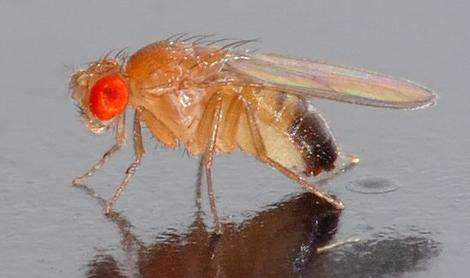Flies with personality

(Phys.org) —Fruit flies may have more individuality and personality than we imagine.
And it might all be down to a bit of genetic shuffling in nerve cells that makes every fly brain unique, suggest Oxford University scientists.
Their new study has found that small genetic elements called 'transposons' are active in neurons in the fly brain. Transposons are also known as 'jumping genes', as these short scraps of DNA have the ability to move, cutting themselves out from one position in the genome and inserting themselves somewhere else.
The inherent randomness of the process is likely to make every fly brain unique, potentially providing behavioural individuality – or 'fly personality'. So says Professor Scott Waddell, who led the work at the University of Oxford Centre for Neural Circuits and Behaviour: 'We have known for some time that individual animals that are supposed to be genetically identical behave differently.
'The extensive variation between fly brains that this mechanism could generate might demystify why some behave while others misbehave,' he suggests.
The Oxford researchers, along with US colleagues at the University of Massachusetts Medical School and Howard Hughes Medical Institute, were able to deep-sequence the DNA from small numbers of nerve cells in the brains of Drosophila fruit flies.
They identified many transposons that were inserted in a number of important memory-related genes. Whether this is detrimental or advantageous to the fly remains an open question, the researchers say.
Scott Waddell notes that neural transposition has been described in rodent and human brains, and transposons have historically been considered to be problematic parasites. New insertions of transposons can on occasion disrupt genes (as was found in this study), and transposons have been associated to some human disorders such as schizophrenia.
However, it is also possible that organisms have harnessed transposition to generate variation within cells, and by extension create variation between individual animals that may turn out to be favourable.
Scott Waddell wants next to determine whether neural transposition provides an explanation for variation in fruit fly behaviour by finding ways of halting the process in flies in his lab.
More information: www.sciencemag.org/content/340/6128/91.abstract
Provided by Oxford University

















